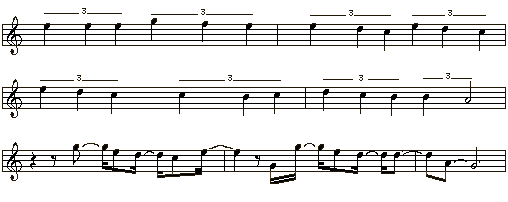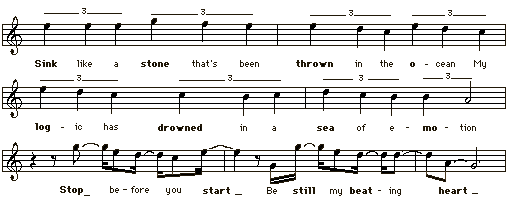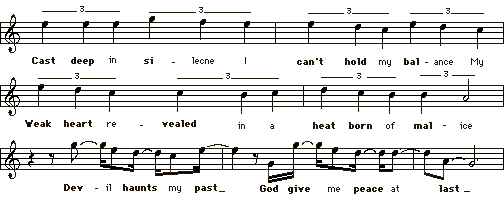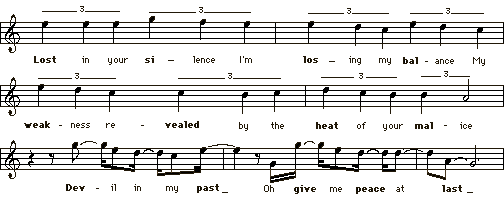
Pat's Lyric Tips
Looking for the Perfect Match
Some people think they've got it rough shopping for their ideal mate. Kid stuff. Songwriters are the ones who really suffer, because whether or not we're happily married, we are eternally condemned to keep searching for the perfect match every time we join a word to a note. Sometimes we find it, sometimes we don't. And even when a match is perfect, we know we'll be back on the streets one syllable/note later, eyes open, determined, hopeful. Perhaps this chapter will offer some succor to the tormented songwriter.
Words and notes start with something in common: both belong to dynamic communities of stressed and unstressed members. The trick is to match each with their own type, stressed notes with stressed syllables, unstressed with unstressed. Recognizing which is which is sometimes easy, sometimes an art: depending partly on the words and notes themselves, partly on their context.
Look at a bar of 4/4 time. The first half-note is stronger than the second, though they are both stressed.
"Bridegroom" would fit the bar perfectly: both syllables are stressed but the first syllable is stronger:

A perfect match. Now look at the phrase "Please darling, come back." "Come back" is the opposite of "bridegroom." Again, both syllables are stressed, but now the second is stronger.
come báck
Setting come báck like "bridegroom" would be poor prosody -- the musical stresses and the syllables' stresses would be opposite.

Not that a poor match breaks any mythical rules; it just sounds unnatural. We lose the illusion of a real person making a real statement, deflating the emotion of the language and distracting the listener. This is crucial: a song is simply natural speech, exaggerated.
If you said, "Most defeated lovers, sooner or later, dream of making a comeback," then "comeback" would be stressed like "bridegroom."

A perfect match.
Recognizing Word Stresses
Syllables are the basic building blocks of all language. If you're not used to dividing words into syllables, check your dictionary. If you don't have one, stop reading and buy one. It is a tool of your trade.
Words with two or more syllables have an accent mark over one of the syllables, indicates the word's main STRESS. In English, all words of two or more syllables have a primary stress, creating sonic shape (or a "little melody") to help your ear recognize the group as a unit. Stressed syllables are...
a) higher in pitch
b) louder
c) longer
Words of two or more syllables have a little melody, with the stressed syllable "on the beat".
Pronounce the word "incision" as naturally as you can five times. Now, slow down and listen to yourself. Hear differences between syllables. "Ci" is higher, louder, and longer than the other two.
ci
in sion
Multi-syllable words are easy because we agreeon them. They're listed in our book of agreements -- the dictionary.
So how about one-syllable words, the staple of English and especially of lyrics? Don't bother looking in the dictionary; it doesn't mark one-syllable words.
One-syllable words are stressed when they have an important job to do, like delivering a message. Nouns, verbs, adjectives, and adverbs all get sweaty because they work hard, like these:
track list risk luck slick hard stem strip
Unstressed one-syllable words mostly just stand there and hold signs to show the workers where to go. They don't sweat. Like these:
Prepositions (e.g., of, to, on, toward)
articles (e.g., a, an, the)
conjunctions (e.g., and, or, but)
auxiliary verbs indicating tense (e.g., have run, had run
auxiliary verbs indicating mood (e.g., might run, may run)
personal pronouns (e.g., I, him, their)
relative pronouns (e.g., which, who, when)
Of course, any of them canbe stressed when a contrastis involved.
I asked you to throw the ball to me, not at me.
I asked you to throw the ball to me, not to her.
I asked you to throw the ball, not him.
Look at this verse is from Sting. Read it a few times first, then we'll try to mark its accented syllables.
Sink like a stone that's been thrown in the ocean
My logic has drowned in a sea of emotion
Stop before you start
Be still my beating heart
Do the easy part first -- find words with more than one syllable:
Sink like a stone that's been thrown in the ocean
My logic has drowned in a sea of emotion
Stop before you start
Be still my beating heart
Now get out your sweat detector:
Sink like a stone that's been thrown in the ocean
My logic has drowned in a sea of emotion
Stop before you start
Be still my beating heart
Beforein line three is interesting: though it contains a stressed syllable, the word itself is a preposition, a sign holder. Don't marry its stressed syllable to a note that works hard. The Stress on before is pretty wimpy. They wouldn't get along with a sweaty note.
All the other unstressed words are standing around directing traffic. The rhythms are pretty regular, moving from two lines of triples to two lines of duples:
Dum da da Dum da da Dum da da Dum da
da Dum da da Dum da da Dum da da Dum da
Dum da Dum da Dum
da Dum da Dum da Dum
Sometimes, finding stress is harder, especially in strings of one-syllable words with hard-to-judge gray areas. Don't panic. The most important words are usually easy. Let's try.
When I got home the house was dark.
Start with the obvious sweathogs.
When I got home the house was dark.
"The" and "was" are clearly unstressed. How about When I got?
"When" probably isn't stressed. In context, "I" could be stressed if someone else was coming home. "Got" could be stressed if the lights came on (maybe a surprise party) soon afterwards. But most likely, we are looking at da da da Dum da Dum da Dum: When I got home the house was dark.
It is quite clear what the first three words are not.They are notthe most important words in the phrase -- typical for words in gray areas. Even if some words aren't so clear, you know which ones are the hardest working. No problem setting this phrase to music -- just save the sweaty beats for the wettest words. Work the gray ones out with a little trial and error.
Recognizing Musical Stress
Whether the lyric is written before, at the same time, or after the music, its syllables are intended to fit with notes. If you are going to match them up, you'll have to know how to tell sweaty notes from dry ones.
In a bar of 4/4 time, the first (downbeat) and third quarter-notes are stressed. The second and fourth aren't. This is the same pattern of strong-to-weak established by half-notes.

These words seem to work:
Run to mama
Eighth notes create four stressed positions per bar, though 1 and 3 still dominate:

Two-syllable prepositions like "before" and "over" don't work hard enough to put the stress in a strong musical position. The stressed 8th notes of beat two and four fit them perfectly. Not too wet, not too dry.
4/4-time is architectonic : it preserves the same pattern (strong-to-weak) through all of its subdivisions, no matter how small -- eights, sixteenths, thirty-seconds, etc. This is important for setting words into measures with rests and mixed note values.
Scan this music for strong beats,

The triplets in the first four bars are easy, lining up
Dum da da Dum da da. Dumda da Dum da da
Dum da da Dum da da. Dum da da Dum da
Bar five runs Dum da Dum da /(Dum), The first stress is an anticipation that adds strength to beat three. The second stress is weaker, anticipating the fourth beat -- a perfect place for a syllable like before. The third stress anticipates a downbeat, making it the strongest position in the phrase.
Bars six and seven are the most interesting.

(Dum)/ da Dum da Dum da Dum. The anticipation of beat three is clearly stressed. The anticipation of beat four is, again, less strong. The dotted eighth ending bar six seems unstressed, even though it is tied to a downbeat. In the context of the phrase, it pales with all the strength around it. It is too far away from the downbeat. Similarly, the final cadence is subdued, ending as an anticipation of beat two, though its length gives the note a little extra punch. What words would fit this music? Try these:

Lyricists spend a lot of time trying to match patterns -- word patterns to note patterns, or words to words, like writing a second verse to match a first. What if you had to write another section to match this one by Sting? Look at it closely. Not only should you line up your stressed and unstressed syllables exactly the same, you also should put your most important words in the same places.
Look at this try,
Cast deep in silence I can't hold my balance
My weak heart revealed in a heat born of malice
Devil haunts my past
God give me peace at last
Let's scan it for stresses:
Cast deep in silence I can't hold my balance
My weak heart revealed in a heat born of malice
Devil haunts my past
God give me peace at last
Set to Sting's melody, it looks like this:

Look at all the places where stressed syllables appear in unstressedmusical positions. These "greedy" spots sound hurried and unnatural, calling attention away from the emotion of the line. Cool dry spots would have trouble connecting with such sweaty bruisers. It would be a bad match, not to mention bad prosody.
How about this one?
Yet in your silence I've just got my balance
My weakness is now in the place of your malice
Won't you help me past
And get me out at last
Scan it,
Yet in your silence I've just got my balance
My weakness is now in the place of your malice
Won't you help me past
And get me out at last

This one's too cool. It pretends to say something in all those important musical places, but ends up just sounding overwrought. Enough to lose anyone's interest, especially those sweaty notes hoping for someone to match their passion.
Another try:
Lost in your silence I'm losing my balance
My weakness revealed by the heat of your malice
Devil in my past
Oh give me peace at last
Scan it.
Lost in your silence I'm losing my balance
My weakness revealed by the heat of your malice
Devil in my past
Oh give me peace at last
Look how it lines up with the music:

Marital bliss. This one is just right, matching the prosody of the original. Note and word stresses match, and the most important words are in the same places. Dry with dry, wet with wet.
Now it's your turn to write a perfect match to Sting's music. Take your time, and write a better one than I did. Happy matchmaking!